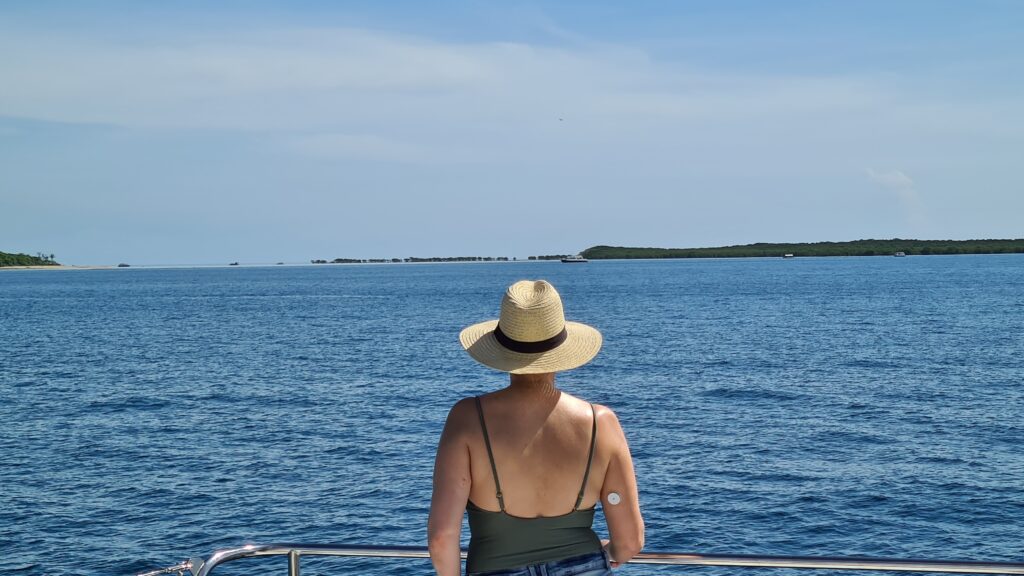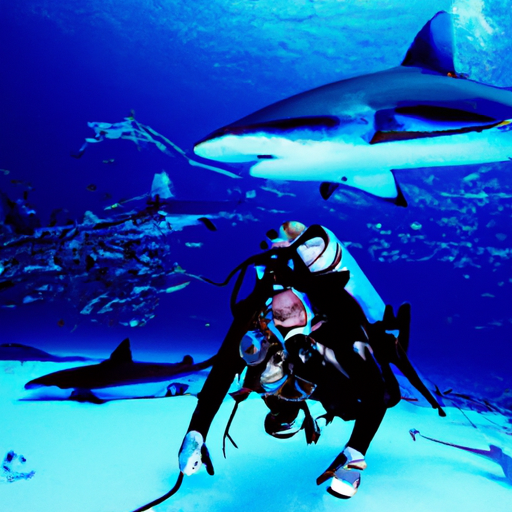So, you’re probably wondering if shark diving is worth it. In this article, we’ll discuss the pros and cons of shark diving and help you decide if it’s an experience you should go for. We’ll explore the thrill of getting up close with these magnificent creatures, the safety considerations involved, and the ethical concerns around shark diving. By the end, you’ll have a better understanding of whether shark diving is a worthwhile adventure for you.

Understanding Shark Diving
Shark diving has gained popularity in recent years as an exciting and adventurous underwater activity. But what exactly is shark diving, and why do people choose to engage in this thrilling experience? In this article, we will delve into the world of shark diving, exploring its benefits, risks, and ethical considerations. By the end, you will be able to make an informed decision on whether shark diving is worth it for you.
What is shark diving?
Shark diving involves exploring the underwater world in close proximity to sharks. This can be done either through scuba diving or from the safety of a shark cage. It allows individuals to witness these magnificent creatures up close and personal, surrounded by the beauty of their natural habitat.
Why do people go shark diving?
People are drawn to shark diving for a variety of reasons. Firstly, the educational value of shark diving cannot be underestimated. Observing sharks in their natural environment provides a unique opportunity to learn about their behavior, physiology, and ecological role. It allows for a deeper understanding and appreciation of these animals, dispelling common misconceptions and fostering a sense of conservation.
Secondly, the thrill and adrenaline rush associated with shark diving is undeniable. The mixture of excitement and fear creates an unforgettable experience that pushes individuals out of their comfort zones. The sheer power and grace of these apex predators is awe-inspiring, leaving a lasting impression on those who dare to jump into the water with them.
Thirdly, shark diving offers a unique underwater experience. It allows individuals to witness the intricate beauty of marine life, not just sharks but also other fascinating creatures like colorful fish, coral reefs, and sea turtles. The opportunity to explore the underwater world from a perspective only a few get to experience is one of the main appeals of shark diving.
Lastly, shark diving can contribute to conservation efforts. By supporting responsible shark diving operators and engaging in sustainable practices, individuals can help raise awareness about the importance of protecting these species and their habitats. This symbiotic relationship between tourism and conservation can be a powerful tool in preserving the world’s oceans and the incredible creatures that inhabit them.
Common shark diving destinations
Shark diving opportunities can be found in various locations around the world. Some of the most popular destinations include:
- Guadalupe Island, Mexico: Known for its crystal-clear waters and great white shark encounters, Guadalupe Island offers a unique opportunity to observe these majestic creatures up close.
- South Africa: Cage diving in South Africa’s famous Shark Alley allows for thrilling encounters with great white sharks, as well as other shark species such as bronze whalers and copper sharks.
- The Bahamas: The Bahamas is renowned for its shark diving experiences, including the chance to swim alongside tiger sharks and Caribbean reef sharks in warm, turquoise waters.
- Australia: The Great Barrier Reef and Ningaloo Reef are popular spots for shark diving, with opportunities to encounter a variety of species, including grey nurse sharks and whale sharks.
These destinations, among others, provide diverse experiences and cater to different preferences, ensuring there is a shark diving destination for everyone.
Benefits of Shark Diving
Educational value of shark diving
Shark diving offers a hands-on learning experience unlike any other. Witnessing sharks in their natural habitat provides a chance to observe their behavior, feeding patterns, and social dynamics. It allows individuals to challenge preconceived notions and dispel common myths surrounding these creatures. Through guided tours and educational briefings, divers can gain a deeper appreciation for the vital role sharks play in maintaining a healthy marine ecosystem.
Thrill and adrenaline rush
For those seeking an exhilarating adventure, few experiences can match the thrill of diving with sharks. The adrenaline rush that comes from being in close proximity to these powerful predators is unmatched. The silent anticipation as a shark glides through the water, the heart-pounding moments when they swim just inches away – these are the moments that will stay with you forever.
Unique underwater experience
Shark diving provides a unique opportunity to explore the mesmerizing underwater world. From the vibrant colors of coral reefs to the graceful movements of marine life, the underwater environment is a sight to behold. By immersing yourself in this awe-inspiring ecosystem, you can gain a newfound appreciation for the wonders of the ocean.
Contribution to conservation efforts
By participating in shark diving activities, individuals can contribute to conservation efforts. Responsible operators prioritize the well-being of the sharks and their habitats, ensuring minimal disruption to their natural behavior. Additionally, the revenue generated from shark diving can be used to fund research, conservation projects, and marine protected areas, benefiting the entire ecosystem.
Risks and Challenges of Shark Diving
Safety concerns and mitigating measures
As with any adventure activity, there are inherent risks associated with shark diving. However, reputable shark diving operators prioritize safety above all else. Strict safety protocols, such as extensive briefing sessions, experienced guides, and well-maintained equipment, are in place to minimize the risks involved. It is important to choose a licensed and certified operator to ensure a safe and enjoyable experience.
Perception versus reality: debunking myths
Sharks have long been portrayed as dangerous and bloodthirsty creatures in popular culture. Shark diving provides an opportunity to dispel these misconceptions and understand the true nature of these animals. The reality is that sharks are not mindless killers but rather highly evolved predators that play a crucial role in maintaining the balance of the marine ecosystem.
Overcoming personal fears and anxieties
For many, the decision to go shark diving involves facing personal fears and anxieties. The fear of sharks is deeply ingrained in our society due to misrepresentation and sensationalized media coverage. However, with proper education and guidance, it is possible to overcome these fears and approach shark diving with a sense of respect and awe.
Costs and Accessibility
Financial considerations
Shark diving can vary in cost depending on the destination and package chosen. Expenses may include transportation, accommodation, diving equipment rental, and the cost of the actual dive. It is important to budget accordingly and research different operators to find the best value for a safe and fulfilling experience.
Availability of shark diving packages
Shark diving packages are widely available, with options catering to different budgets and experience levels. From single-day tours to multi-day excursions, there are opportunities for both beginners and advanced divers. It is essential to choose a reputable operator that follows sustainable practices and prioritizes the well-being of the sharks.
Physical requirements and limitations
Shark diving requires a certain level of physical fitness and comfort in the water. While scuba diving certification is not always necessary, it is recommended to have basic swimming skills and be in good health. Individuals with certain medical conditions or physical limitations should consult with a healthcare professional before embarking on a shark diving adventure to ensure suitability and safety.

Environmental Impact of Shark Diving
Effects on shark behavior and natural habitats
The impact of shark diving on shark behavior and natural habitats is a topic of ongoing research and debate. While some studies suggest that shark diving can lead to habituation and changes in behavior, others argue that with responsible practices, the effects can be minimal. It is crucial that operators adhere to strict guidelines and prioritize the well-being of the sharks to minimize any potential negative impact.
Importance of responsible shark diving practices
Responsible shark diving practices are essential for minimizing environmental impact. These practices include maintaining a respectful distance from the sharks, minimizing stress through proper diving techniques, and not engaging in any behavior that could harm the sharks or their habitats. By adhering to these guidelines, divers can contribute to the long-term sustainability of shark populations.
Positive influence on local economies
Shark diving can have a positive impact on local economies, especially in areas where sharks are already a tourism attraction. The revenue generated from shark diving activities can be used to fund conservation projects, create marine protected areas, and support local communities. By fostering a sustainable and responsible tourism industry, shark diving can play a role in preserving both the environment and the livelihoods of those who depend on it.
The Ethical Debate
Arguments against shark diving
The ethics of shark diving are a contentious issue. Critics argue that shark diving can lead to excessive interaction and disturbance of sharks, causing stress and altering their natural behavior. Concerns are also raised about commercialization and the potential for exploitation in some areas. These arguments highlight the need for strict regulations and careful monitoring of shark diving activities.
Criticism of commercialization and exploitation
Some critics argue that shark diving has become a lucrative industry that prioritizes profit over the well-being of the sharks. Unregulated and irresponsible shark diving practices can lead to overcrowding, excessive interaction, and disturbance of sharks. It is essential to support operators and organizations that prioritize conservation and adhere to responsible guidelines.
Balancing tourism and conservation
Finding a balance between tourism and conservation is a challenge that extends beyond shark diving. It requires collaboration between stakeholders, including local communities, governments, scientists, and tourists. By implementing strict regulations, supporting sustainable tourism practices, and promoting education and awareness, it is possible to strike a balance that benefits both the sharks and the communities that rely on them.

Personal Experiences from Shark Divers
Testimonials of shark diving enthusiasts
Shark diving has left a profound impact on many individuals, transforming their perceptions and sparking a deep passion for marine life. Testimonials from shark diving enthusiasts often highlight the exhilaration, beauty, and educational value of the experience. Many describe their encounters as life-changing, with a newfound appreciation for the intricate balance of nature.
Life-changing encounters and memorable moments
Encounters with sharks in their natural habitat are often described as some of the most memorable moments in a person’s life. From the elegance and power of a great white shark gliding through the water to the playful curiosity of a reef shark, these encounters leave a lasting impression and inspire a lifelong commitment to the conservation of these magnificent creatures.
Alternatives to Shark Diving
Exploring underwater without direct interaction
For those who prefer to appreciate the beauty of sharks without entering their territory, there are alternative ways to explore the underwater world. Snorkeling, for example, allows individuals to observe sharks from the surface while maintaining a safe distance. Additionally, marine conservation organizations offer research and volunteer opportunities, allowing individuals to contribute to shark conservation efforts without directly interacting with the animals.
Observing sharks in controlled environments
For those seeking a more controlled and educational experience, aquariums and marine parks offer the opportunity to observe sharks up close without entering their natural habitat. These controlled environments prioritize the well-being and conservation of the sharks, providing opportunities for education and awareness.

Expert Opinions on Shark Diving
Perspectives from marine biologists and conservationists
Marine biologists and conservationists offer valuable insights into the world of shark diving. They stress the importance of responsible practices and emphasize the educational value of these experiences. Many argue that when conducted responsibly, shark diving can provide a unique opportunity for individuals to connect with these animals, foster a sense of stewardship, and contribute to conservation efforts.
Conclusion
Is shark diving worth it? The answer ultimately depends on your personal preferences and individual values. Shark diving offers a unique blend of thrill, education, and conservation that appeals to many adventure-seekers and nature enthusiasts. However, it is essential to choose responsible operators, prioritize the well-being of the sharks, and consider the potential impacts on their behavior and habitats. By making an informed decision and supporting sustainable practices, you can contribute to the protection of these incredible creatures and ensure a positive and worthwhile experience for both you and the sharks.

- Can You Dive With Sharks In California? - August 19, 2024
- What Are The Rules Of Shark Cage Diving? - August 19, 2024
- Where In Florida Can You Dive With Sharks? - August 19, 2024








